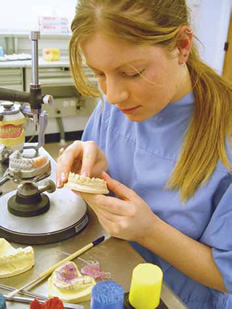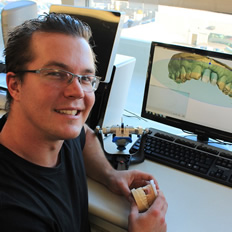Professional registration
The fact that the product can affect the health and appearance of a person demands of the technician a high level of responsibility and accuracy. For this reason, the profession of dental technology is registered under the Health Practitioners Competence Assurance Act 2004.
Graduates with the Bachelor of Dental Technology (BDentTech) degree are automatically entitled to register with the New Zealand Dental Council.
Career opportunities
Dental Technology is a global profession. Throughout the world there is a high demand for skilled dental technicians. The high skill base that New Zealand dental technicians achieve makes them desirable to overseas employers.
In New Zealand and Australia, dental technicians are employed by commercial dental laboratories. These laboratories provide the bulk of the work for the private dental industry, the defence forces, hospitals, and state dental services.
The ratio of employer to employee is approximately 1:3, and many dental technicians ultimately set up business for themselves. There are no barriers to becoming self-employed.
The areas within the profession are diverse, with individuals specialising in different areas of dental technology.
Graduate profiles
Helen Fowke, BDentTech Graduate
 For Helen Fowke, dental technology is the perfect combination of her two great loves—science and art.
For Helen Fowke, dental technology is the perfect combination of her two great loves—science and art.
"I learnt about dental technology at a school careers expo at home in Tauranga and I immediately knew it was for me. I liked that it was technical, but also artistic, and I liked the idea of working with my hands," she says.
Dental technicians work behind the scenes making the appliances that dentists use like crowns, bridges, plates, and dentures.
"It helps if you are good with your hands and have an artistic eye. You need to be able to see the different colours and translucency of a tooth, see its shape and be able to recreate that so no one can tell it isn't the real thing," Helen says.
The course combines studying physics and biology with hands-on construction classes that involve carving wax, making moulds, grinding, polishing, and painting.
"It's hard work, but it's manageable. You can't just cruise," Helen says. "You are constantly dealing with new technology and materials. The lecturers are very helpful. They really know their stuff and have a lot of industry experience."
As part of the course, dental technology students are teamed up with dentistry students and spend time in the Faculty of Dentistry's clinics.
"Working with the dentistry students and watching them fit your appliances is really helpful as a student, because you see why appliances are made in a particular way and really understand the reasoning behind each design. Also, seeing your own work in a mouth is very rewarding and satisfying."
Greg Sigglekow, BDentTech Graduate
 Greg Sigglekow didn't enter the Bachelor of Dental Technology (BDentTech) programme straight away. He started out studying physics in Christchurch, where he was surrounded by other students on a similar pathway. Greg realised he needed to "find something a bit different," and that dental technology would be a good fit.
Greg Sigglekow didn't enter the Bachelor of Dental Technology (BDentTech) programme straight away. He started out studying physics in Christchurch, where he was surrounded by other students on a similar pathway. Greg realised he needed to "find something a bit different," and that dental technology would be a good fit.
"It incorporates the sciences that I enjoy, but with a more hands-on approach, almost in a craftsmanship sense," he explains.
"There is a considerable scope of practice. Maxillofacial reconstructions, orthodontics, prosthodontics, and material science research are really just the front door to each aspect within dental technology. Add to that, every single patient you treat requires an individualised treatment plan, requiring you to think logically and precisely.
"You are constantly challenged to solve intricate and sometimes very complex problems in order to help your patients, while also striving to achieve natural harmony with the various tissues involved. I really enjoy hammering out these challenges!"
Greg's now working as assistant manager and supervisor at a modern dental laboratory in Wellington. His position requires a dental technology qualification, as the main work he does is directly related to his training.
Greg says the training he received at Otago was "incredibly inspiring."
"You're surrounded by great minds from all corners of the world … teaching you methods, knowledge, and experience from medical, dental, and scientific backgrounds," he says.
Now that he's entered the workforce, Greg has no regrets about his decision to switch from physics to dental technology. Reflecting on his career to date, he notes "the real pleasure is when, after you've put all you can into the processes and you get to see your patients genuinely smile again, that's when you know you've changed someone's life forever."